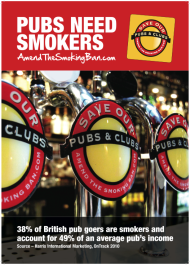Filth column: the politics of hate
 Tuesday, March 16, 2010
Tuesday, March 16, 2010 The film director James Cameron, criticised for allowing a character to smoke in his blockbuster Avatar, defended himself by saying that he knows that smoking is a ‘filthy habit’ – he just doesn’t think he should be forbidden to show it.
"Thanks, James. With friends like you, who needs enemies?" So says musician Joe Jackson in his latest article for The Free Society website, published today. Joe writes:
I took a shower this morning and put on clean clothes. My teeth are brushed and my nails manicured. Can anyone tell me – I mean, in a reasoned, logical way – why I am so ‘filthy’ for smoking tobacco?
Is ‘filth’ a kind of euphemism, by which some people mean that that smoking is aesthetically unpleasant to them? If so, it’s purely a matter of taste, and to insult people just because you don’t share their pleasure is just plain rude.
Personally, I can’t stand dogs – I’m allergic to them, and think they’re smelly. But I can see that many people love them, so I bite my tongue and try to be tolerant. I certainly don’t want the government banning dogs from every pub in the land.
Living in the UK today, Joe concludes, is a bit like being back at school:
Rules and regulations, bullying and humiliation. Except that this is a school in which the teachers actually encourage the bullies to beat up the fat kids, or the kids who don’t like sports, or the kids who don’t like the food ...
One thing’s for sure: so much meanness, intolerance, divisiveness and hate must inevitably provoke a backlash. I can’t wait.
Full article HERE.













